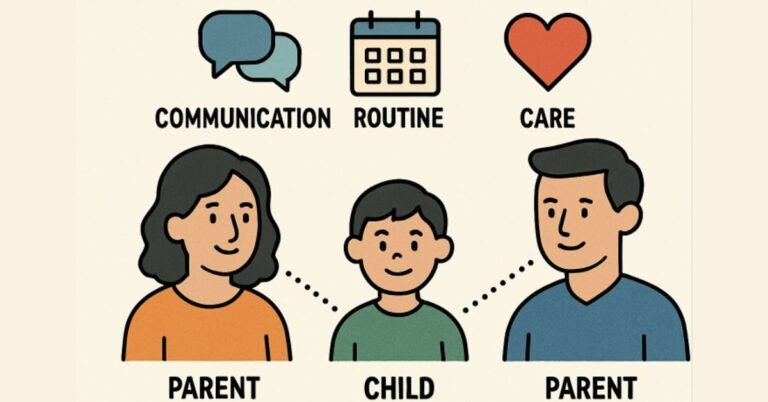Key Takeaways
- Open and respectful communication is essential for successful co-parenting.
- Establishing a consistent routine provides stability for children.
- Utilizing co-parenting apps can streamline communication and scheduling.
- Seeking professional support, such as mediation, can resolve conflicts amicably.
Divorce is a challenging transition, particularly when children are part of the equation. Adjusting to new family dynamics requires careful planning and empathy to ensure children feel secure and loved. Building structure and trust takes time, but thoughtful co-parenting strategies can help families avoid common pitfalls. If you are navigating this process, consulting with family law professionals, such as the experienced www.robinsonandhenry.com/locations/colorado-springs/divorce-attorneys/, can be critical to safeguarding your child’s well-being through this significant change.
Children benefit most when both parents commit to a cooperative, child-first mindset. While negative emotions may surface, prioritizing respectful dialogue and consistent routines can transform households from adversarial to collaborative. Embracing resources and proactive habits early streamlines co-parenting and provides much-needed emotional stability for children as they adjust to life after divorce.
Prioritize Open Communication
Successful co-parenting begins with clear, honest communication. Misunderstandings or unspoken resentments between co-parents can lead to unnecessary conflict and confusion for children. It is crucial to establish a regular mode of communication—whether by text, email, or a dedicated parenting platform—that allows parents to share routines, updates, and information about their child without unnecessary tension. Focus on facts and logistics, and avoid discussing personal issues that could reignite past grievances. According to the American Psychological Association, child-focused communication eases the transition and supports your children’s emotional health.
Establish a Consistent Routine
Children thrive in stable, predictable environments. Divorce can disrupt family schedules, making it more important than ever for co-parents to agree on routines. Syncing calendars for transitions, extracurricular activities, and holidays avoids last-minute conflicts and gives children a sense of normalcy. Consistency enables children to adjust more easily, reducing the anxiety that often accompanies life changes after divorce. Research cited by the American Psychological Association shows that routines serve as anchors for children, helping them feel safe amid change.
Utilize Co-Parenting Apps
Modern technology offers practical solutions for navigating co-parenting logistics. Apps help streamline shared calendars, keep communication transparent, and document agreements on expenses or emergencies. These platforms reduce misunderstandings and offer a neutral place to address schedule adjustments, track shared costs, or upload important files like school forms and medical records. Using co-parenting apps fosters better organization and minimizes the risk of miscommunication, as everything is documented and accessible to both parents.

Seek Professional Support
Professional mediation can be invaluable if tensions run high or parents cannot independently create a workable co-parenting plan. Family law mediators provide a neutral environment where parents can address disputes constructively, focusing on what is best for their children rather than persisting in conflict. Professional assistance ensures that voices are heard equally and compromises reached fairly, often leading to more successful and lasting arrangements. Mediation is recommended in contentious cases, as it can help families avoid prolonged legal battles that could negatively affect the children.
Set Boundaries and Respect Personal Space
Healthy boundaries are a cornerstone of effective co-parenting. This means respecting each other’s privacy, honoring parenting time without intrusion, and refraining from involving children in adult conversations or disputes. Never use children as messengers between households or speak ill of the other parent in front of them. Setting boundaries helps children maintain positive relationships with parents and shields them from unnecessary stress, ensuring they feel securely loved in both homes.
Focus on the Child’s Needs
The child’s well-being must always take precedence over parental disagreements. This means supporting your child’s emotional, educational, and physical development by attending school events, maintaining a regular bedtime, and fostering open discussions about their feelings. Encouraging your child to have a healthy relationship with their other parent—without guilt or jealousy—promotes their sense of security and self-worth. Putting aside personal conflicts to focus on your child’s needs can greatly ease the transition and foster long-term resilience.
Stay Flexible and Adaptable
Even the best-laid plans sometimes need adjusting due to unexpected events like illness, work changes, or special occasions. It is important to approach these moments with flexibility, understanding, and an attitude of compromise. Being adaptable—and willing to swap days or adjust routines when necessary—shows children that both parents are committed to working together for their best interests, even under changing circumstances. Flexibility reduces frustration and builds trust as co-parents navigate post-divorce life together.
Final Thoughts
Co-parenting after divorce is an ongoing journey that requires patience, mutual respect, and a focus on your child’s happiness. By prioritizing communication, consistency, respect, and adaptability, divorcing families can create positive, stable environments in which children can thrive. Enlisting the help of reputable legal professionals further ensures that your family’s legal and emotional needs are protected throughout the process.

